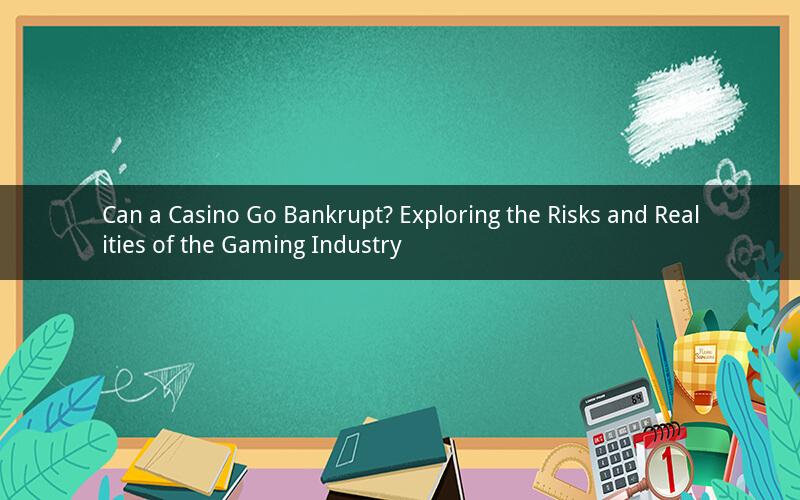
Introduction:
Casinos are often perceived as places where people come to win money, but the reality is that they are businesses that operate under significant financial risks. One of the most pressing questions in the gaming industry is whether a casino can go bankrupt. In this article, we will delve into the various factors that can lead to a casino's bankruptcy, the consequences of such an event, and the measures taken to prevent it.
1. Factors Leading to Casino Bankruptcy
1.1 Market Competition: The gaming industry is highly competitive, with numerous casinos vying for customers. Excessive competition can lead to a decline in revenue, making it difficult for a casino to sustain its operations.
1.2 Economic Downturns: Economic instability can have a profound impact on the gaming industry. During downturns, consumers may cut back on spending, leading to a decrease in gambling revenue for casinos.
1.3 Overreliance on High-Risk Borrowing: Casinos often rely on high-interest loans to fund expansion projects, renovations, and other expenses. If a casino is unable to generate enough revenue to cover its debt obligations, it may face bankruptcy.
1.4 Legal Issues: Casinos can face legal challenges, including violations of gambling laws, money laundering, or other illegal activities. Legal issues can lead to substantial fines, lawsuits, or even the closure of the casino.
2. Consequences of Casino Bankruptcy
2.1 Job Losses: Bankruptcy can result in the loss of numerous jobs, including positions in gaming, hospitality, and support services.
2.2 Financial Impacts on Local Communities: Casinos often generate significant revenue for local governments, which can fund various public services and programs. Bankruptcy can lead to a reduction in these funds, impacting the local community.
2.3 Negative Impact on Real Estate Values: Casinos are typically located in prime real estate locations. Bankruptcy can lead to a decline in property values, affecting the local economy.
3. Preventing Casino Bankruptcy
3.1 Diversification of Revenue Streams: Casinos can reduce their vulnerability to economic downturns by diversifying their revenue streams. This may include expanding into other gaming options, such as sports betting or online gambling.
3.2 Strategic Management: Casinos need to have a strong, strategic management team in place to navigate the industry's challenges. This includes effective risk management, financial planning, and marketing strategies.
3.3 Legal Compliance: Ensuring compliance with gambling laws and regulations is crucial for a casino's long-term success. This includes regular audits, training staff, and staying informed about changes in the industry.
3.4 Building Strong Relationships with Stakeholders: Casinos can mitigate the risks of bankruptcy by maintaining positive relationships with their employees, customers, suppliers, and local communities.
Frequently Asked Questions:
1. Question: Can a casino go bankrupt due to poor management?
Answer: Yes, poor management can lead to a casino's bankruptcy. Factors such as ineffective decision-making, lack of financial oversight, and insufficient marketing strategies can all contribute to a decline in revenue and an increase in costs.
2. Question: Are there any casino bankruptcy examples?
Answer: Yes, there have been several high-profile casino bankruptcy cases, including the 2008 bankruptcy of the Las Vegas Sands Corporation, which owned the Venetian and Palazzo resorts.
3. Question: How do casinos manage their debt?
Answer: Casinos can manage their debt through a combination of prudent financial planning, debt restructuring, and refinancing. They may also seek alternative funding sources, such as bonds or loans from financial institutions.
4. Question: Can a casino's bankruptcy impact its employees?
Answer: Yes, a casino's bankruptcy can have a significant impact on its employees, leading to job losses, reduced benefits, and uncertainty about the future of their employment.
5. Question: Are there any laws that protect casinos from bankruptcy?
Answer: While there are no specific laws that prevent casinos from going bankrupt, there are regulations that govern the gaming industry, including laws on gambling, money laundering, and financial reporting. Compliance with these regulations can help mitigate the risks of bankruptcy.
Conclusion:
The question of whether a casino can go bankrupt is a complex one, with various factors contributing to a casino's financial stability or downfall. By understanding the risks and taking proactive measures to mitigate them, casinos can increase their chances of long-term success in the highly competitive gaming industry.